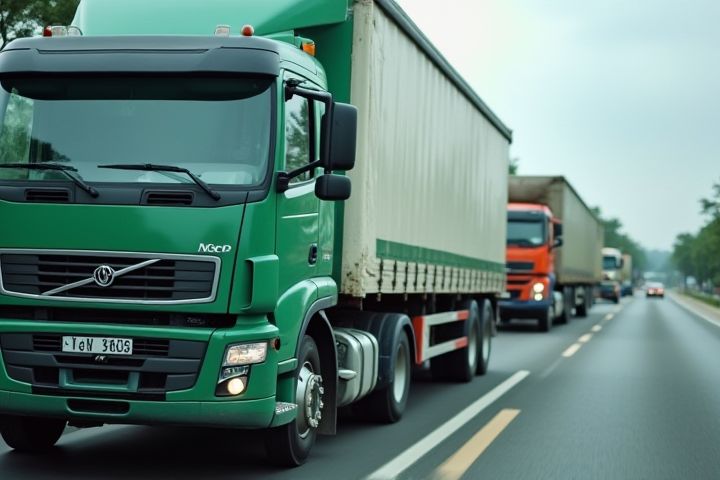
Nigeria's transport systems encompass road, rail, air, and waterways, each playing a crucial role in the country's economy. The road network spans approximately 200,000 kilometers, facilitating the movement of goods and people across diverse regions. Rail transport, primarily operated by the Nigerian Railway Corporation, is experiencing revitalization efforts aimed at increasing efficiency and connectivity between urban centers. Airports, including Murtala Muhammed International Airport in Lagos, serve as vital hubs for both domestic and international travel, enhancing Nigeria's global connectivity. Waterways, especially the Niger and Benue Rivers, provide alternative transport routes for cargo, promoting trade and reducing road congestion.
Road infrastructure
Nigeria's transport systems heavily rely on road infrastructure, representing the most utilized mode of transportation in the country. The network consists of over 200,000 kilometers of roads, connecting urban centers to rural areas and facilitating trade and mobility. Key roadways, such as the Lagos-Ibadan Expressway, are vital for economic activities and play a crucial role in passenger travel. Despite challenges in maintenance and traffic congestion, investments in road construction and rehabilitation continue to enhance transportation efficiency and safety across Nigeria.
Rail network
Nigeria's rail network is undergoing significant modernization to enhance transportation efficiency and connectivity across the country. The Nigerian Railway Corporation is spearheading initiatives to expand rail lines linking key cities, facilitating both passenger and freight movement. Investments in high-speed trains and improved infrastructure aim to reduce travel time and promote economic growth. By utilizing rail transport, you can enjoy a more sustainable and cost-effective alternative to road travel, alleviating congestion and promoting environmental benefits.
Lagos BRT system
The Lagos Bus Rapid Transit (BRT) system represents a significant investment in Nigeria's urban transport infrastructure, designed to alleviate traffic congestion and enhance public transportation efficiency. This dedicated bus network operates on exclusive lanes, facilitating faster travel times across the bustling metropolis of Lagos. With its introduction of modern buses and user-friendly ticketing options, the BRT aims to provide a reliable alternative for millions of commuters daily. By prioritizing sustainable public transit solutions, the Lagos BRT system plays a crucial role in addressing the environmental challenges associated with increased vehicular emissions and urban sprawl.
Inland waterways
Inland waterways in Nigeria serve as crucial transport systems, facilitating the movement of goods and passengers across the country's extensive river networks, particularly the Niger and Benue Rivers. These waterways enhance connectivity between urban and rural communities, promoting trade and economic growth in regions that are otherwise challenging to access via road or rail. The Nigerian government is investing in modernizing infrastructure, such as jetties and terminals, to improve navigation safety and efficiency. You can explore opportunities in this sector, as growing investments create a demand for service providers and innovations in logistics.
Airports and aviation
Nigeria's aviation sector features several key airports, including Nnamdi Azikiwe International Airport in Abuja and Murtala Muhammed International Airport in Lagos, which serve as crucial hubs for both domestic and international flights. The country's commitment to improving its aviation infrastructure has led to significant investments in airport modernization and enhanced safety standards. With a growing fleet of both commercial and cargo airlines, Nigeria fosters connectivity and economic growth through air travel. You can explore various airlines that offer services tailored to meet the needs of passengers, making air travel a viable option for transport within Nigeria.
Interstate bus services
Nigeria's transport systems primarily emphasize interstate bus services, connecting major cities like Lagos, Abuja, and Port Harcourt. These buses operate on well-established routes, offering various classes of travel from luxury coaches to standard seating. The Nigerian government and private companies invest in infrastructure improvements to enhance the safety and comfort of long-distance travel. Travelers can take advantage of online booking platforms, allowing for easier access to schedules and ticket purchases.
Motorcycle taxis (Okada)
Motorcycle taxis, commonly known as Okadas, play a crucial role in Nigeria's urban transport systems, especially in densely populated areas where traffic congestion is prevalent. These two-wheeled vehicles provide an agile means of navigating narrow streets and reaching destinations quickly, catering to the needs of commuters seeking efficiency. With their affordability and ease of access, Okadas have become a popular choice for locals, offering vital links to public transport networks and remote neighborhoods. However, safety regulations and operational standards are increasingly necessary to address the challenges associated with this mode of transportation, ensuring a balanced approach to urban mobility.
Tricycles (Keke Napep)
Tricycles, commonly known as Keke Napep, play a crucial role in Nigeria's transportation landscape, providing an affordable and efficient means of mobility in urban areas. Operating on narrow roads and bustling markets, these three-wheeled vehicles offer flexibility and accessibility, catering to the needs of commuters who face limited public transport options. With their distinctive design and vibrant colors, Keke Napep not only enhance urban aesthetics but also contribute significantly to local economies by offering jobs to numerous drivers. You can navigate through the often congested streets while enjoying a localized travel experience that reflects Nigeria's culture and vibrancy.
Traffic congestion
Traffic congestion in Nigeria significantly impacts urban transport systems, primarily due to a growing population and inadequate infrastructure. Major cities like Lagos experience severe gridlock, resulting in increased travel times and pollution levels. The government's efforts to enhance public transportation, such as the Bus Rapid Transit (BRT) system, aim to alleviate these challenges by offering efficient alternatives. For an improved commute, embracing alternative transport methods, such as bicycles or ride-sharing services, can be a practical solution for individuals facing daily congestion.
Safety and regulations
Transport systems in Nigeria emphasize safety protocols and regulatory frameworks to enhance the overall effectiveness of transportation networks. The Federal Road Safety Corps (FRSC) plays a pivotal role in enforcing traffic laws, promoting road safety education, and reducing accident rates across the nation. Rail transport is also undergoing significant improvements with new regulations aimed at ensuring safety standards, efficiency, and reliability. By prioritizing these safety measures, Nigeria aims to create a more reliable transport environment that protects both passengers and goods in transit.
